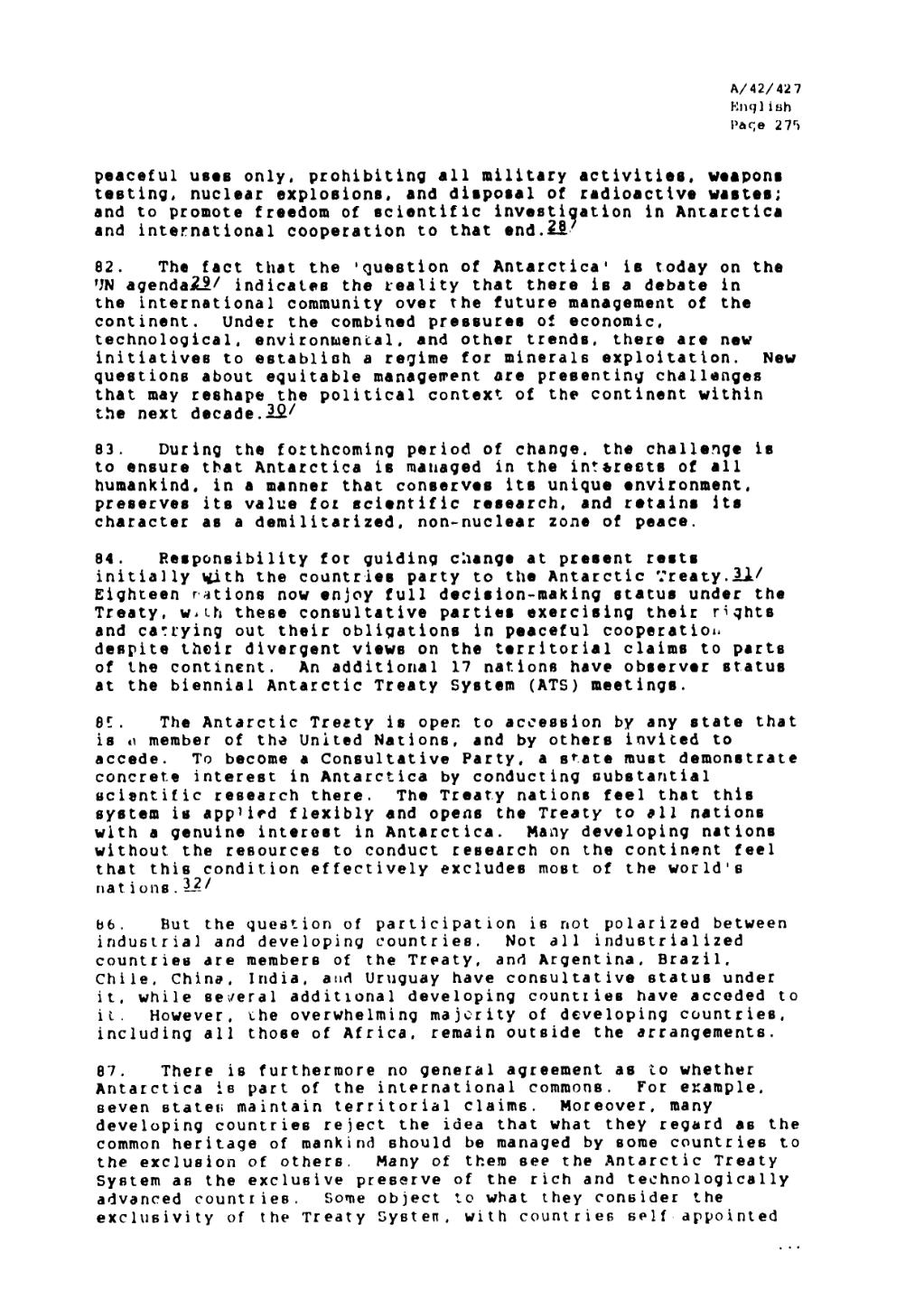A/42/427
English
Page 275
peaceful uses only, prohibiting all military activities, weapons testing, nuclear explosions, and disposal of radioactive wastes; and to promote freedom of scientific investigation in Antarctica and international cooperation to that end.[1]
82. The fact that the 'question of Antarctica' is today on the UN agenda[2] indicates the reality that there is a debate in the international community over The future management of the continent. Under the combined pressures of economic, technological, environmental, and other trends, there are new initiatives to establish a regime for minerals exploitaton. New questions about equitable management are presenting challenges that may reshape the political context of the continent within the next decade.[3]
83. During the forthcoming period of change. the challenge is to ensure that Antarctica is managed in the interests of all humankind, in a manner that conserves its unique environment, preserves its value for scientific research, and retains character as a demilitarized, non-nuclear zone of peace.
84. Responsibility for guiding change at present rests initially with the countries party to the Antarctic Treaty[4] Eighteen rations now enjoy full decision-making status under the Treaty, with these consultative parties exercising their and carrying out their obligations in peaceful cooperation despite their divergent views on the territorial claims to parts of the continent. An additional 17 nations have observer status at the biennial Antarctic Treaty System (ATS) meetings.
85. The Antarctic Treaty is open to accession by any state that is a member of the United Nations, and by others invited to accede. To become a Consultative Party, a state must demonstrate concrete interest in Antarctica by conducting substantial scientific research there. The Treaty nations feel that this system is applied flexibly and opens the Treaty to all nations with a genuine interest in Antarctica. Many developing nations without the resources to conduct research on the continent feel that this condition effectively excludes most of the world's nations.[5]
86. But the question of participation is not polarized between industrial and developing countries. Not all industrialized countries are members of the Treaty, and Argentina, Brazil, Chile, Chin, India, and Uruguay have consultative status under it, while several additional developing countries have acceded to it. However, the overwhelming majority of developing countries, including all those of Africa, remain outside the arrangements.
87. There is furthermore no general agreement as to whether Antarctica is part of the international commons. For example.
seven states maintain territorial claims. Moreover, many developing countries reject the idea that what they regard as the common heritage of mankind should be managed by some countries to the exclusion of others. Many of them see the Antarctic Treaty System as the exclusive preserve of the rich and technologically advanced countries. Some object to what they consider the exclusivity of the Treaty Systen, with countries self appointed
- ↑ 'Antarctic: A Continent in Transition', Fact Sheet Folio, International Institute for Environment and Development, London. 1986.
- ↑ In 1983, the Seventh Summit Conference of the Non-Aligned Countries included a paragraph on Antarctica in its communique. That same year, the question of Antarctica was put on the agenda of the UN General Assembly. The debate resulted in a consensus resolution asking for the elaboration of a special report by the Secretary General, which was debated by the UN General Assembly at its 39th Session in November 1984. The consensus has not been maintained. At subsequent General Assembly sessions, resolutions on Antarctica have been passed over the objections of the parties to the Treaty, most of whom chose not to participate in the vote.
- ↑ L. Kimball, 'Testing the Great Experiment', Environment, September 1985.
- ↑ 'Antarctic Treaty' concluded 1 December 1959 and entered into force 23 July 1961, summarized in M.J. Bowman and D.J. Harris (eds.), Multilateral Treaties: Index and Current Status (London: Butterworths, 1984).
- ↑ They include the original seven claimants: Argentina, Australia, Chile, France, New Zealand, Norway, and the Unite Kingdom; an additional five who were original signatories: Belgium, Japan, South Africa, USSR and the United States; plus six who have since acceded to the Treaty and become full Consultative Parties: Poland (1977), the Federal Republic of Germany (1981), Brazil and India (1983), and China and Uruguay (1985). Any country can accede to the Treaty, becoming a full 'Consultative Party' providing, and during such time as, it demonstrates an interest in the continent through the presence of a substantial scientific activity. Seventeen other countries have acceded to the Treaty, but do not hold consultative status. Since 1983, they have been invited to attend Antarctic Treaty meetings as observers.
